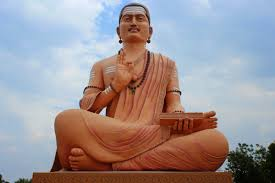Indian Heritage & Culture
Anubhava Mantapa in Basavakalyan: Karnataka
- 07 Jan 2021
- 5 min read
Why in News
Recently, the Chief Minister of Karnataka has laid the foundation stone for the ‘New Anubhava Mantapa’ in Basavakalyan, the place where 12th century poet-philosopher Basaveshwara lived for most of his life.
Key Points
- About the New Anubhava Mantapa:
- It will be a six-floor structure in the midst of the 7.5-acre plot and represent various principles of Basaveshwara’s philosophy.
- It will showcase the 12th Century Anubhava Mantapa (often referred to as the “first Parliament of the world”) established by Basaveshwara in Basavakalyan where philosophers and social reformers held debates.
- The building will adopt the Kalyana Chalukya style of architecture.
- Later Chalukyas, popularly known as the Chalukyas of Kalyan or Kalyani Chalukyas form an integral part of ancient Karnataka history of early medieval period. Kalyan Chalukya rulers patronised temple construction, dance and music, as their predecessors did.
- The grand structure supported by 770 pillars will have an auditorium with a seating capacity of 770 people.
- It is believed that 770 Sharanas (followers of Basaveshwara) led the Vachana reformist movement in the 12th Century.
- On its top, the structure would have a Shiva Linga placed on a large pedestal.
- The project also envisages state-of-the-art robotic system, open-air theatre, modern water conservation system, terrace garden, library, research centre, prayer hall, yoga centre and so on.
- Basaveshwara:
- Brief Profile:
- Basaveshwara (1134-1168) was an Indian philosopher, social reformer and statesman who attempted to create a casteless society and fought against caste and religious discrimination.

- Basava Jayanthi is an annual event celebrated in the honour of the birth of Vishwaguru Basaveshwara.
- He was born in Bagevadi (of undivided Bijapur district in Karnataka).
- The tradition of Lingayatism is known to have been founded by him.
- Basaveshwara (1134-1168) was an Indian philosopher, social reformer and statesman who attempted to create a casteless society and fought against caste and religious discrimination.
- Philosophy:
- His spiritual discipline was based on the principles of Arivu (true knowledge), Achara (right conduct), and Anubhava (divine experience) and it brought social, religious and economical revolution in the 12th century.
- This path advocates a holistic approach of Lingangayoga (union with the divine). This comprehensive discipline encompasses bhakti (devotion), jnana (knowledge), and kriye (action) in a well balanced manner.
- He went to Kalyana (now called Basavakalyan) probably in the year A.D. 1154. His achievements in the short span of twelve or thirteen years of his stay at Kalyana are striking.
- The Gates of Dharma were thrown open to all without any barriers of caste, creed or sex (Kalyana Rajya - Welfare State).
- He established the Anubhava Mantapa, which was a common forum for all to discuss the prevailing problems of socio, economic and political strata including religious and spiritual principles along with personal problems.
- Thus, it was the first and foremost Parliament of India, where Sharanas sat together and discussed the socialistic principles of a Democratic set up.
- He gave two more very important socio-economic principles. They are:
- Kayaka (Divine work): According to this, every individual of the society should take up the job of his choice and perform it with all sincerity.
- Dasoha (Equal distribution):
- There must be an equal income for equal work.
- The worker (Kayakajeevi) may lead his day-today life by his hard earned income. But he should not preserve the money or property for tomorrow. He must utilise the
- surplus money for the society and poors.
- Brief Profile:
- Vachana Reformist Movement:
- The main aim of the Vachana (poetry) movement, led by Basaveshwara in 12th century, was welfare of all.
- It attempted to address class, caste and to some extent gender issues in a given societal milieu.






